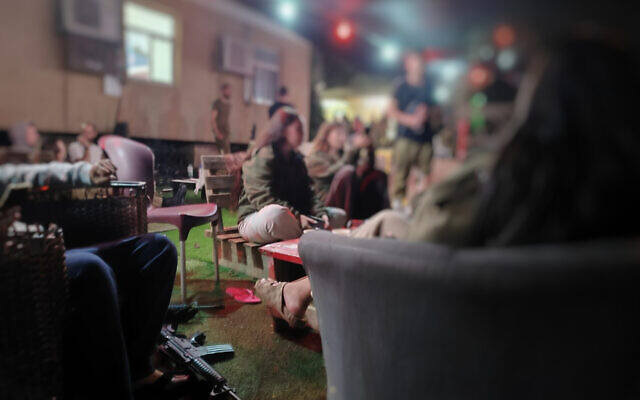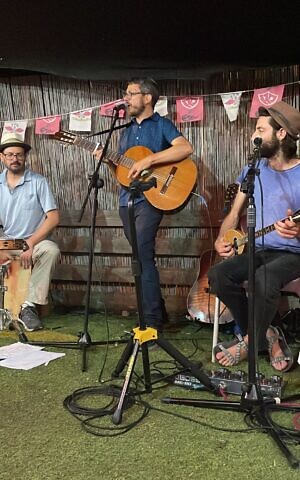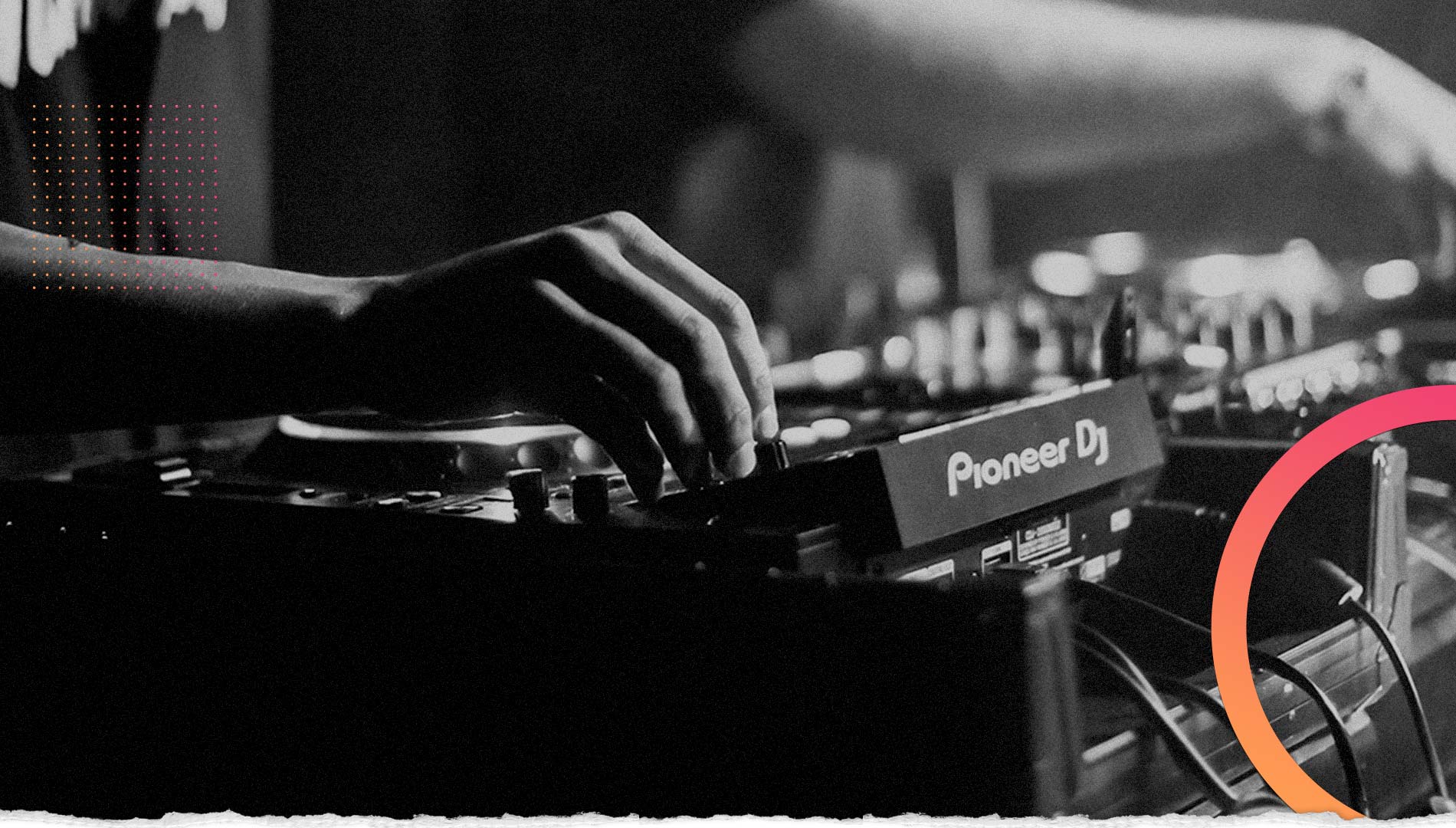They let us — the musicians — into the IDF base in the Golan Heights easily enough.
We pull right up to the gate and the young guard comes out, regarding us quizzically. But we are expected, and we know the magic words: “Dafna’s permission.” So they just wave us through, and into the sprawling compound we go.
It’s just another Thursday night in Israel’s new reality, and even citizen-soldiers in wartime need to party a bit. I am here accompanying my old friend, Izhar Pintus, an educator and musician, who has volunteered us to “La’asot Sameach” for a group of reserve soldiers.
Literally meaning “to do happiness,” La’asot Sameach has become, since that terrible Shabbat/Simchat Torah of October 7, a bit of a catchphrase among Israel’s groups of working musicians and performers. Like a lot of the country’s civilian population, the entertainers have turned their focus to volunteering their services, and, with nearly all paying gigs canceled, have found new venues in playing for soldiers, the traumatized, evacuees in hotels, and many other places. In some cases, people are volunteering to perform for other volunteers.
Elitzur Goldsmith, a dapper, thin man who arrived with a small sound system and plays Greek bouzouki, played six non-paying gigs this week, he tells me. He has traveled the length and breadth of the country to do so. And then he dragged himself out of bed and drove for over an hour to get here.
For Pintus, it is the third or fourth such evening since the war began. A professional educator who is on a sabbatical, his last gig was with musicians and improvising dancers at a hotel in Tiberias, for a group of survivors from one of the kibbutz pogroms.
But for me, despite 20 years in Israel, this is my first time on an IDF base and it is confusing. The layout is chaotic, and there are private cars parked everywhere, deposited by the soldiers who drove to their postings. Some of their families back home do not have access to a car at all and make do without. At another location, on the way here, I saw hundreds of cars just parked alongside the road, likely left by groups of called-up reserve soldiers near their induction points.
To get to our venue, we drive past machinery, personnel transports and several buildings, including one huge, well-lighted hanger where soldiers appear to be gathering supplies. People are walking around everywhere, in and out of uniform, and the environment is relaxed. Finally, we make it to the spot, the barracks, where they have set up an outside recreational area.
IDF reserve soldiers on base, on October 19, 2023. (Gavriel Fiske/Times of Israel)
The soldiers here are a cross-section of ages, in their 20s, 30s and 40s. They make a diverse group of men and women — a real citizens’ army — and all have their M-16s. Some wear uniforms, some tracksuits or other civilian clothes, some a bit of both. Nearby, a set of weights and a bench press are in constant use.
There are a few older guys who are a bit out of shape, a few long-haired dudes, plenty of women with dyed hair and long nails, and a few men with kippas. Some just sit and scroll on their phones, not engaging at all. But most are talking and laughing, taking their ease with the situation and processing their new lives. Cigarette smoke is everywhere.
Under normal, relatively peaceful times, reserve duty is done with the same cadre of individuals for a limited period, over many years, which forges a deep bond among the group. Due to the unusual circumstances of this call-up, and the large number of reservists involved, it seems that many of the people here just met at the start of the war. Pintus tells me it is likely this group won’t see action on the front lines; rather, they have taken over the position here from soldiers needed elsewhere.

Soldiers on reserve duty, on October 19, 2023. (Gavriel Fiske/Times of Israel)
There is food everywhere. Some guys are crowded around a giant barbeque setup. There are two tables for coffee and tea; another table has a pile of donated fruit, cakes and other treats; and by the entrance, there is a huge pile of boxes containing army rations. One friendly, middle-aged man in uniform walks around with a tray of baklava. We are invited to partake, and everyone is friendly and happy we are there.
It seems like an informal party — “Where’s the beer?” one fellow keeps asking — but it’s not, and no alcohol is served. These reserve soldiers, until a few weeks ago, were living their normal lives. Their families, jobs, responsibilities, their leisure time — that’s all from another world, and not just for the moment. No one knows when this will end, and the leaders have recently promised that it will be a long war.
Despite the barbeque — and now someone else is walking around with a tray of grilled chicken and kabab – one group seems to have formed a vegan corner. One young man in uniform, with multiple earrings and long hair, loudly tells a joke: “My poor mom, she told me, I don’t care what you do, don’t have a job, do drugs, or if you are gay, I will love you, but please, don’t become a vegan!’’ and everyone laughs.

Playing music for reserve soldiers, on October 19, 2023. From left to right, Gavriel Fiske, Izhar Pintus and Elitzur Goldsmith. (Courtesy)
The three of us musicians pitch in to set up the sound system in a corner and after a brief sound check, we launch into it.
Pintus rocks his guitar and sings, Goldsmith runs the sound and rips out soulful solos on his bouzouki. I’ve brought a simple percussion set-up to accompany them. It’s not a real concert — more like an informal sing-a-long of the country’s greatest Hebrew-language hit songs, interrupted by lots of good-natured banter.
Pintus is good. He has a lot of experience reading a crowd and getting people engaged. Some pull up lyrics on their smartphones and belt out the lines with passion, especially a few classic hits like “Matanot Katanot” by Rami Kleinstein.
A few tables over, a group is playing a lively game of cards.
At one point, Pintus starts talking about the Torah portion of the week, and one soldier, who looks about as secular as you can imagine, excitedly mentions that this is his bar mitzva parsha. He starts a sing-song recital of the initial lines from memory, and then says, amazed, “I haven’t thought about that in 20 years.” Everyone then sings to him: “HaYom Yom Huledet,” the Israeli happy birthday song.
We finally finish after a few encores and special requests. We pack up our equipment while the remaining soldiers, just like that, jump up to clean the whole area. They are happy we came and appreciated the special evening, which their commander arranged.
Before we leave on our long drive home, one woman, sitting in the corner, stops us with an observation.
“I had a normal life… There are people here who haven’t been in miluim [reserve duty] for 12 years and have now been called up. They haven’t seen their kids since… But we have to do it, it’s our country.”
Some details in this story were altered due to security concerns.









